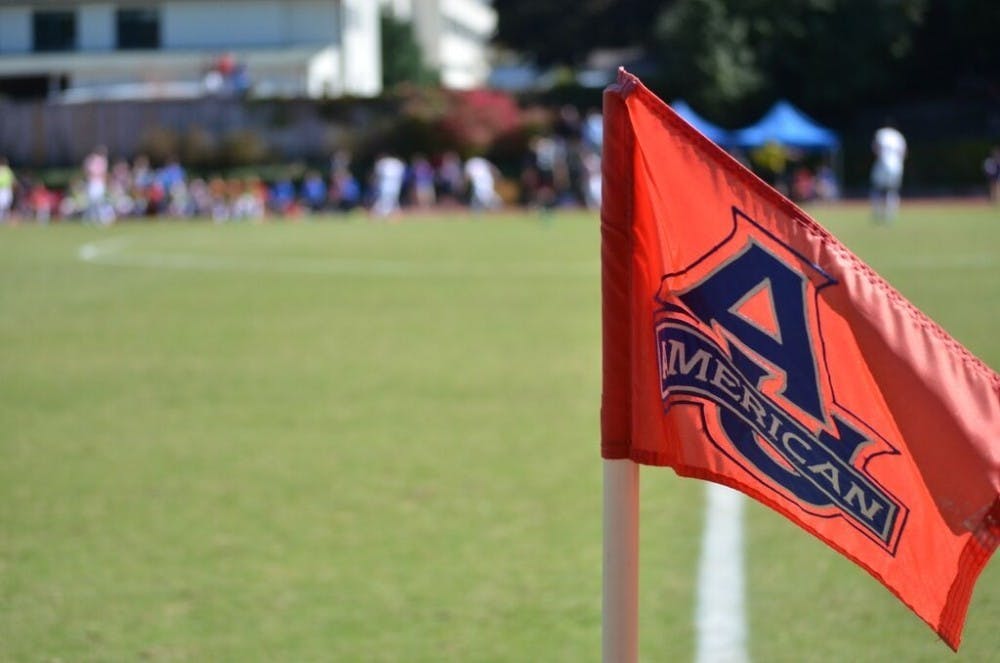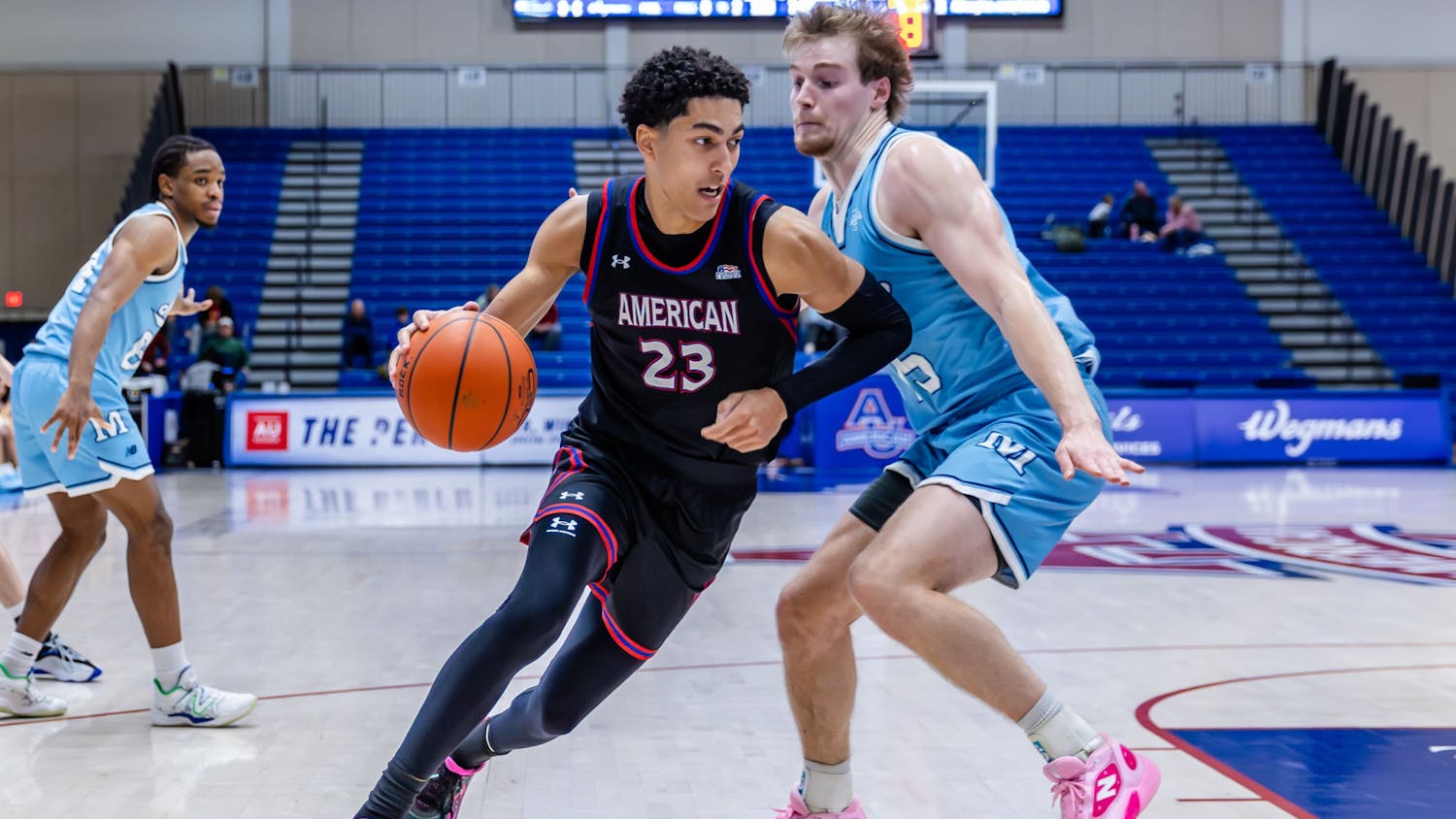Editor’s note: This article originally appeared on theeaglecoronavirusproject.com, a separate website created by Eagle staff at the onset of the coronavirus pandemic in spring 2020. Articles from that website have been migrated to The Eagle’s main site and backdated with the dates they were originally published in order to allow readers to access them more easily.
In response to the spread of the coronavirus, athletic programs around the country have had to adjust their plans for the spring season and alter off-season practice routines for fall and winter sports. The same applies for AU Athletics.
After the NCAA canceled winter and spring championships in March, athletes and coaches had to adjust to a new normal.
For the AU wrestling team, their postseason was cut short right before they were set to send four wrestlers to the NCAA tournament. Head Coach Teague Moore anticipated that a big decision would be made in the lead up to the tournament getting canceled.
“The NCAA said they were limiting the event to athletes, coaches and family before the cancellation,” Moore said. “Then professional sports started shutting down. That’s when I thought, ‘Oh boy, this is not good for us.’”
Moore said he and his players found out about the NCAA’s decision to cancel the tournament through social media. He immediately started to think about how to make sure his players were safe and thanked them for their seasons.
“I felt bad. I apologized that they weren’t gonna be able to get that opportunity,” Moore said. “They represented us very well during the season.”
With the NCAA not providing an extra year of eligibility to winter athletes, senior Sal Profaci’s NCAA wrestling career was over. Profaci transferred to AU from the University of Michigan for his last year of eligibility and earned a spot at the NCAA tournament after finishing the regular season ranked 29th in the country in his weight class in the last coaches poll ranking. He went 26-9 on the year and was chosen by his teammates as the MVP of the season.
“He put a lot of effort into this opportunity,” Moore said. “He made a whole life decision to get his master’s and come to American. Knowing that that was his last opportunity to compete for a national championship and he put so much into it, I couldn’t put into words how bad I felt for him. My heart goes out to him and every guy in his situation.”
While Moore was happy that spring athletes were getting an extra year of eligibility, he expressed disappointment for the wrestlers who were getting ready to compete for a championship, but no longer got another shot at it.
“I really thought we were gonna give winter athletes the chance to compete again,” Moore said. “In our sport, as in most sports in the NCAA, the pinnacle is the championships. Everyone’s striving towards a national championship. Why wouldn’t we give those 330 athletes another chance to compete?”
While winter sports teams across the country grapple with lost opportunities at championships, spring sports athletes must rebound from abrupt ends to their regular seasons, and fall sports athletes are trying to move forward with offseason training.
The lacrosse team is just one of those spring teams that was forced to make harrowing adjustments. After going 7-0 in non-conference competition, the team looked the best they had in a long time under interim Head Coach Maureen Breslin.
“We were just finishing our non-conference schedule when the decision by the Patriot League and the NCAA to shut down spring sports happened,” Breslin said. “You know, it was a really hard blow to the team and me and the assistant coaches because we were off to such a great start being 7-0, which was the best start in school history for the program, and we were really looking forward to starting conference play and seeing how we did within the Patriot League.”
In her first season as head coach, Breslin has had to adjust from thinking she was going to be coaching games and holding practices to holding weekly Zoom talks with her athletes.
“They are continuing as a team to get together electronically and stay fit. We as a full team with coaches and students are meeting once a week online to talk about team culture and personal accountability moving forward,” Breslin said.
The wrestling program has also been trying to keep their team engaged and fit remotely while everyone is at home. But it recently hit a snag due to a ruling from the NCAA.
The NCAA said team directed workouts were too much of a liability, Moore said.
“If one person gets injured and you don’t have an athletic trainer there to help them, god forbid if someone had a heart attack or something like that,” Moore said. “We can give suggestions, but you can’t make it mandatory. Wrestling is a hard sport to learn how to do when you are on your own. You need teammates.”
Since the NCAA offered spring athletes another year of eligibility, many seniors have to decide whether or not to go back to AU and play their fifth year. Lacrosse senior captain Katie Wood said it was a difficult decision for her and the other seniors on the team.
“I think that for a lot of us as seniors the fifth year was a big decision just because we felt like we didn't get to finish things, and it was such an awkward ending that you kind of are left wondering if you had more left in the tank or if you could have given more to the team,” Wood said.
Wood ultimately decided against taking that fifth year because she is ready to pursue a career in politics on Capitol Hill next year.
The spring track team also had to face their season’s cancellation. Twenty-two of the 37 runners on the team are freshmen, and track and cross country team Coach Sean Graham was particularly impressed with how his team is dealing with the circumstances.
“One of the things I'm most happy within this sort of situation is the flexibility that the athletes have shown and their ability to adapt,” Graham said.
Graham thinks the track team has an advantage during this pandemic over other sports since the runners have prior familiarity with training at home by themselves during the summer.
It hasn’t been too difficult for Graham and his assistants to create suggested training plans for the athletes, even though the NCAA has banned online training for the time being in a mandated team setting.
“You know we are basically a full year in-season sport,” Graham said. “We are not able to mandate that they do a specific training plan, but we give them all the information we think they need to be successful in the season to come in cross country.”
There is no clear time when this will end, but for AU Athletics, the grind to improve has not stopped.
“It's been very very hard, I'll be honest,” Graham said. “Particularly for the players. I've just been so beyond impressed with their ability to deal with this and adapt to it and have a positive attitude.”





